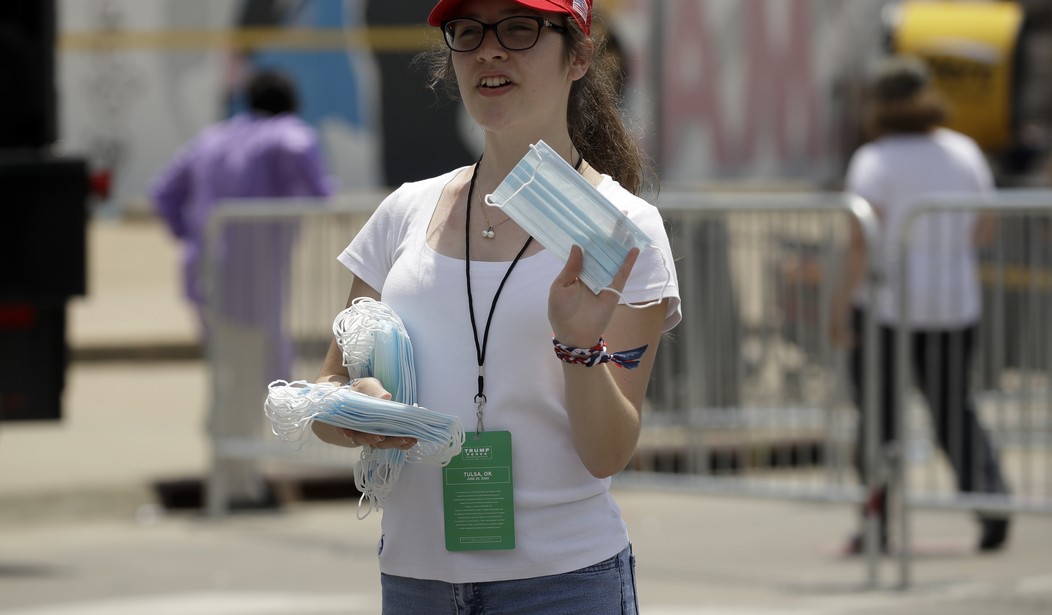As mask mandates continue to fall throughout the country in places most never would have predicted just two weeks ago, those of us who have longed for a return to normalcy are breathing a sigh of relief and enjoying the ride.
However, habitual mask-wearers, particularly those aligned with the political left, aren't celebrating, not by a long shot. Instead, they are clinging to their face diapers like Linus iron-grips his security blanket, and they aren't about to let go anytime soon. We've all seen it play out time and time again with Branch Covidian mask-worshippers we know online and even personally. No amount of data or reason will sway them, but why?
Turns out, the likeliest explanation for this illogical devotion to their weird face mask god is, in fact, rooted in mental illness, one that was eerily described in an article about Japanese mask addition Tor Ching Li wrote for The Straits Times - in 2017.
Article written in April 2017 warns that acculturated masks can become addictive.
— Emma Woodhouse ?? (@EWoodhouse7) May 16, 2021
“People were wearing surgical masks not for the purposes they were intended for...but because they had grown used to living behind the anonymity of a mask.” https://t.co/lLqBdCgJUM
From the piece:
But if you stay in Japan long enough, you would realise that the Japanese love affair with the surgical masks goes beyond health and hygiene - to the realm of psychology and even pathology.
While many wear the mask as a defence against allergens, some use it as a cover-up, a shield against social situations that trigger anxiety.
Figures attest to a phenomenon some have termed "mask dependency": Mask production rose 20 per cent year on year in 2015, to a record high of 4.9 billion pieces, according to latest data from the Japan Hygiene Products Industry Association.
Recommended
"Mask dependency" anyone?
“While some people used to feel safe or secure when going out with a mask, it has reached a stage where they cannot go out without wearing a mask. That's how serious it is getting," said Yuzo Kikumoto, a professional counselor who coined the term "mask dependency" in a 2009.
— Emma Woodhouse ?? (@EWoodhouse7) May 16, 2021
Now, compare what you read above with these excerpts from a NYT article this weekend.
— Emma Woodhouse ?? (@EWoodhouse7) May 16, 2021
Anyone else see “mask dependency”? https://t.co/d5KeA3lfQC pic.twitter.com/JU5a6rxc6N
More:
Mr Yuzo Kikumoto, who set up professional counselling service Kikiwell in 2006, was the first to coin the term "mask dependency" in a paper he wrote in 2009.
People were wearing surgical masks not for the purposes they were intended for, he wrote, but because they had grown used to living behind the anonymity of a mask.
The situation has got even more serious in recent years, Mr Kikumoto told The Straits Times.
The number of mask addicts seeking counselling at his practice has increased by 50 per cent since 2009, he said.
Sufferers are mostly in their 30s to 40s, with women making up slightly more than half of the number , or 60 per cent.
"While some people used to feel safe or secure when going out with a mask, it has reached a stage where they cannot go out without wearing a mask. That's how serious it is getting," said Mr Kikumoto ...
"The mask acts as a security blanket, and people with this addiction cannot talk to people without wearing a face mask. And society's acceptance of interactions behind masks perpetuates such a dependency," said Mr Kikumoto.
Like any addiction, treatment needs to start with recognition and admission, he added.
"Recognition and admission" are great starts. Forget solar panel installers, it's gonna take an ARMY of therapists to dig us out of this one.
Also, at this point, anyone who posits the notion that the West should adopt the Asian model for forever-masking should be laughed out of the room and never taken seriously again.

























Join the conversation as a VIP Member